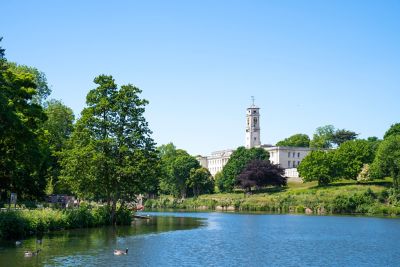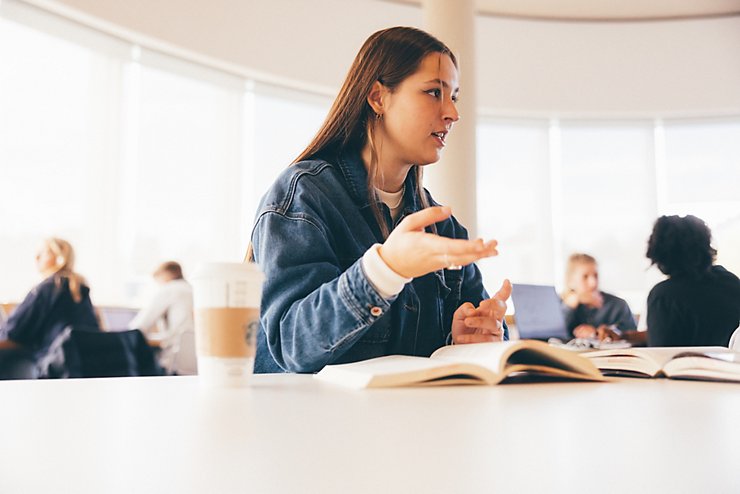*For full details including fees for part-time students and reduced fees during your time studying abroad or on placement (where applicable), see our fees page.
If you are a student from the EU, EEA or Switzerland, you may be asked to complete a fee status questionnaire and your answers will be assessed using guidance issued by the UK Council for International Student Affairs (UKCISA) .
Additional costs
All students will need at least one device to approve security access requests via Multi-Factor Authentication (MFA). We also recommend students have a suitable laptop to work both on and off-campus. For more information, please check the equipment advice.
Books
You'll be able to access most of the books you’ll need through our libraries, though you may wish to buy your own copies of core texts. A limited number of modules have compulsory texts which you are required to buy. We recommend that you budget £100 per year for books, but this figure will vary according to which modules you take. The Blackwell's bookshop on campus offers a year-round price match against any of the main retailers (e.g. Amazon, Waterstones, WH Smith). They also offer second-hand books, as students from previous years sell their copies back to the bookshop.
Year Abroad - Reduced fees (subject to change)
As a year abroad student, you will pay reduced fees. For students spending their year abroad in 2023 this was set at:
- Home/EU students: £1,385
- International: 50% of the relevant international fee
Costs incurred during the year abroad
These vary from country to country, but always include:
- travel
- accommodation
- subsistence
- insurance
Depending on the country visited you may also have to pay for:
- visa
- vaccinations
- self-funded language courses
- additional administration fees and study supplies in the host country or organisation
There are a number of sources of funding:
- Student Finance Loan
- Means-tested travel grant
- University of Nottingham bursaries and scholarships
Your access to funding depends on:
- the course you are taking
- your residency status
- where you live in term time
- your household income
You may be able to work or teach during your year abroad. This will be dependent on your course and country-specific regulations. Often students receive a small salary or stipend for these work placements. Working or teaching is not permitted in all countries. More information on your third year abroad.
Volunteering and placements:
For volunteering and placements e.g. work experience and teaching in schools, you will need to pay for transport and refreshments.
Optional field trips:
Field trips allow you to engage with source materials on a personal level and to develop different perspectives. They are optional and costs to you vary according to the trip; some require you to arrange your own travel, refreshments and entry fees, while some are some are wholly subsidised.
Scholarships and bursaries
Faculty of Arts Alumni Scholarships
Our Alumni Scholarships are funding opportunities gifted by some of our alumni who want to help support the next generation through higher education. These scholarships provide eligible students with financial contributions toward essential living costs. Find out more about eligibility and how to apply.
International Students
We offer a range of international undergraduate scholarships for high-achieving international scholars who can put their Nottingham degree to great use in their careers.
Additional costs
All students will need at least one device to approve security access requests via Multi-Factor Authentication (MFA). We also recommend students have a suitable laptop to work both on and off-campus. For more information, please check the equipment advice.
Books
You'll be able to access most of the books you’ll need through our libraries, though you may wish to buy your own copies of core texts. A limited number of modules have compulsory texts which you are required to buy. We recommend that you budget £100 per year for books, but this figure will vary according to which modules you take. The Blackwell's bookshop on campus offers a year-round price match against any of the main retailers (e.g. Amazon, Waterstones, WH Smith). They also offer second-hand books, as students from previous years sell their copies back to the bookshop.
Year Abroad - Reduced fees (subject to change)
As a year abroad student, you will pay reduced fees. For students spending their year abroad in 2023 this was set at:
- Home/EU students: £1,385
- International: 50% of the relevant international fee
Costs incurred during the year abroad
These vary from country to country, but always include:
- travel
- accommodation
- subsistence
- insurance
Depending on the country visited you may also have to pay for:
- visa
- vaccinations
- self-funded language courses
- additional administration fees and study supplies in the host country or organisation
There are a number of sources of funding:
- Student Finance Loan
- Means-tested travel grant
- University of Nottingham bursaries and scholarships
Your access to funding depends on:
- the course you are taking
- your residency status
- where you live in term time
- your household income
You may be able to work or teach during your year abroad. This will be dependent on your course and country-specific regulations. Often students receive a small salary or stipend for these work placements. Working or teaching is not permitted in all countries. More information on your third year abroad.
Volunteering and placements:
For volunteering and placements e.g. work experience and teaching in schools, you will need to pay for transport and refreshments.
Optional field trips:
Field trips allow you to engage with source materials on a personal level and to develop different perspectives. They are optional and costs to you vary according to the trip; some require you to arrange your own travel, refreshments and entry fees, while some are some are wholly subsidised.
Scholarships and bursaries
Faculty of Arts Alumni Scholarships
Our Alumni Scholarships are funding opportunities gifted by some of our alumni who want to help support the next generation through higher education. These scholarships provide eligible students with financial contributions toward essential living costs. Find out more about eligibility and how to apply.
Home students*
Over one third of our UK students receive our means-tested core bursary, worth up to £1,000 a year. Full details can be found on our financial support pages.
* A 'home' student is one who meets certain UK residence criteria. These are the same criteria as apply to eligibility for home funding from Student Finance.







